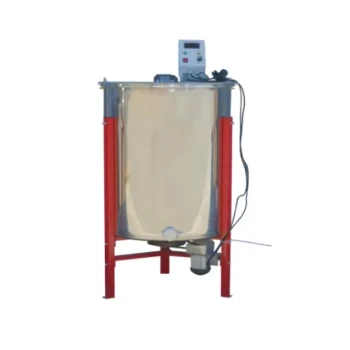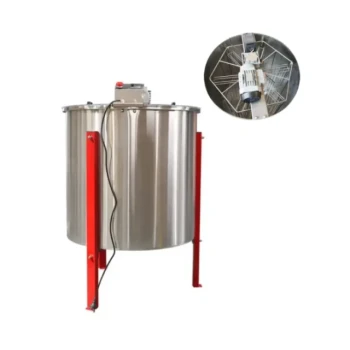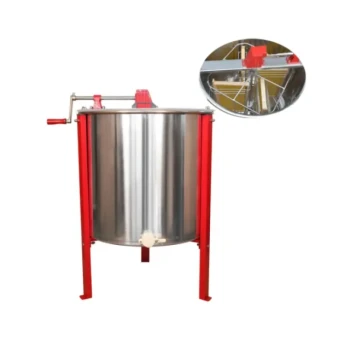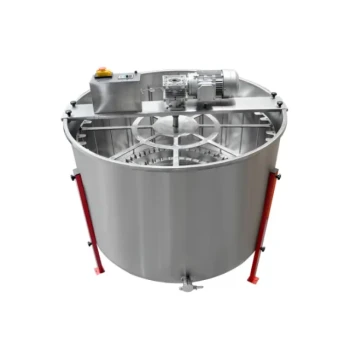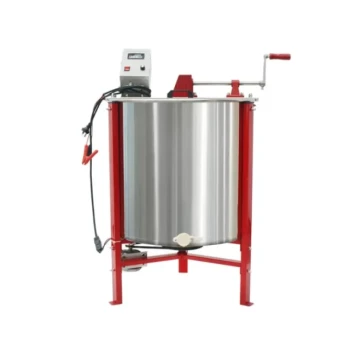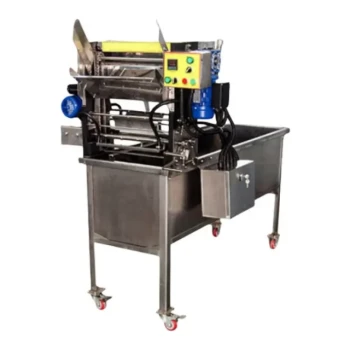The right size honey extractor typically has a frame capacity of about half your total number of hives. For a beekeeper with 4 hives, a 2-frame extractor is a common starting point. This ratio ensures you can process your honey harvest efficiently without investing in equipment that is excessively large or expensive for your operation's scale.
Your choice of an extractor isn't just about your current hive count; it's a strategic decision that balances your budget, available space, time commitment, and future growth plans.
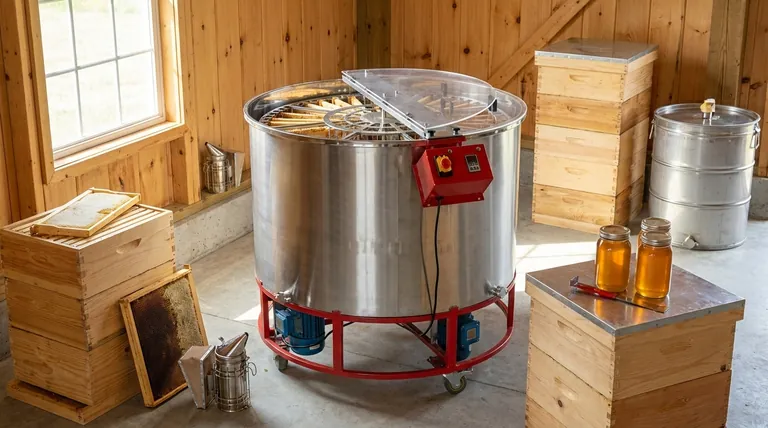
The Core Principle: Matching Extractor to Hive Count
The most common question revolves around a simple number: how many frames should my extractor hold? This is the logical starting point for any beekeeper.
The General Rule of Thumb
A reliable guideline is to choose an extractor that can hold half as many frames as you have hives. This provides a practical balance for most hobbyist beekeepers.
- 1-4 Hives: A 2-frame extractor is sufficient.
- 5-8 Hives: A 4-frame extractor will save significant time.
- 9-18 Hives: An 8 or 9-frame extractor is a wise investment.
This rule prevents the extraction process from becoming an overwhelming, multi-day chore.
Why This Ratio Works
A standard deep hive box (a "super") contains 8 to 10 frames. With 4 hives, you might pull two supers for a total of 16-20 frames.
A 2-frame extractor requires you to run 8-10 cycles. A 4-frame extractor cuts that work in half. The goal is to find the sweet spot where the work remains manageable.
Beyond Hive Count: Critical Decision Factors
While hive count sets a baseline, other factors significantly influence the best choice for your specific needs. The "size" is tied directly to these features.
Manual vs. Electric Operation
This is the most significant decision after capacity. A manual, hand-crank extractor is simple, requires no power, and is the most affordable option.
An electric extractor, however, automates the spinning process. This dramatically reduces physical effort and saves a considerable amount of time, especially with larger harvests.
Material and Durability
Extractors are primarily made from two materials. Plastic extractors are lightweight and the least expensive but can be less durable over the long term.
Stainless steel is the industry standard. It is food-grade, highly durable, and easy to clean, making it a better long-term investment for any serious beekeeper.
Tangential vs. Radial Design
This technical detail is crucial for efficiency. Tangential extractors place frames like spokes in a wheel, with one side of the comb facing out. You must manually flip the frames to extract honey from both sides. Most small, 2-4 frame models are tangential.
Radial extractors place frames with the top bar facing out, allowing centrifugal force to pull honey from both sides simultaneously. They hold more frames and are significantly faster because they don't require flipping.
Understanding the Trade-offs
Choosing an extractor is an exercise in balancing competing priorities. Being aware of these compromises will lead you to the right decision.
The Cost vs. Time Equation
There is a direct relationship between what you spend and how fast you work. A larger, electric, stainless steel, radial extractor will cost the most but will process your honey in a fraction of the time.
A small, manual, plastic, tangential extractor is very budget-friendly but requires the most time and physical labor per frame.
The Space Commitment
Do not underestimate the physical footprint. A large extractor requires significant storage space in the off-season. Ensure you have a dedicated spot in a garage or shed where it can be stored safely and kept clean.
Planning for Future Growth
It is often wise to buy for the apiary you plan to have in two years, not the one you have today. If you start with 2 hives but plan to expand to 6, buying a 4-frame extractor from the start will prevent you from needing to upgrade after just one season.
Making the Right Choice for Your Goal
Your beekeeping goals should be the final filter for your decision. Match the equipment to your ambition.
- If your primary focus is a small hobby (1-4 hives): A 2-frame or 4-frame manual tangential extractor is a cost-effective and perfectly adequate choice.
- If your primary focus is growing your apiary (5-15 hives): Invest in a small electric radial extractor or a larger (6-9 frame) manual model to save significant time and effort.
- If your primary focus is efficiency and larger production (16+ hives): A large electric radial extractor made of stainless steel is a necessary piece of equipment, not a luxury.
Ultimately, selecting the right extractor is about investing wisely in your time to make honey harvest a joy, not a burden.
Summary Table:
| Hive Count | Recommended Extractor Size | Key Considerations |
|---|---|---|
| 1-4 Hives | 2-Frame | Ideal for hobbyists; cost-effective and space-efficient. |
| 5-8 Hives | 4-Frame | Balances time savings and investment for growing apiaries. |
| 9-18 Hives | 8/9-Frame | Best for efficiency; reduces harvest time significantly. |
| 16+ Hives | Large Electric Radial | Essential for commercial-scale production and maximum efficiency. |
Ready to invest in the right honey extractor for your apiary? At HONESTBEE, we supply durable, high-performance beekeeping equipment—including stainless steel and radial extractors—to commercial apiaries and distributors. Our wholesale-focused operations ensure you get the best value for your investment. Contact us today to discuss your needs and streamline your honey harvest!
Visual Guide

Related Products
- HONESTBEE 72 Frame Industrial Electric Honey Extractor for Beekeeping
- Electric 8 Frame Honey Spinner Extractor Equipment for Beekeeping
- 2 Frame Stainless Steel Manual Honey Spinner Extractor for Beekeeping
- Professional 4 Frame Self Reversing Electric Honey Extractor for Beekeeping
- HONESTBEE 6 Frame Self Reversing Electric Honey Extractor for Beekeeping
People Also Ask
- What are the main types of honey extractor machines available? Choose the Right Extractor for Your Apiary's Scale
- What are the advantages of automated honey extractors in terms of time efficiency? Boost Your Harvest Speed
- What are the advantages of electric honey extractors? Boost Efficiency for Your Commercial Apiary
- What are the main types of honey extractor machines? A Guide for Beekeepers
- How long does it take to extract honey with an electric extractor? Automate Your Harvest for Greater Efficiency



